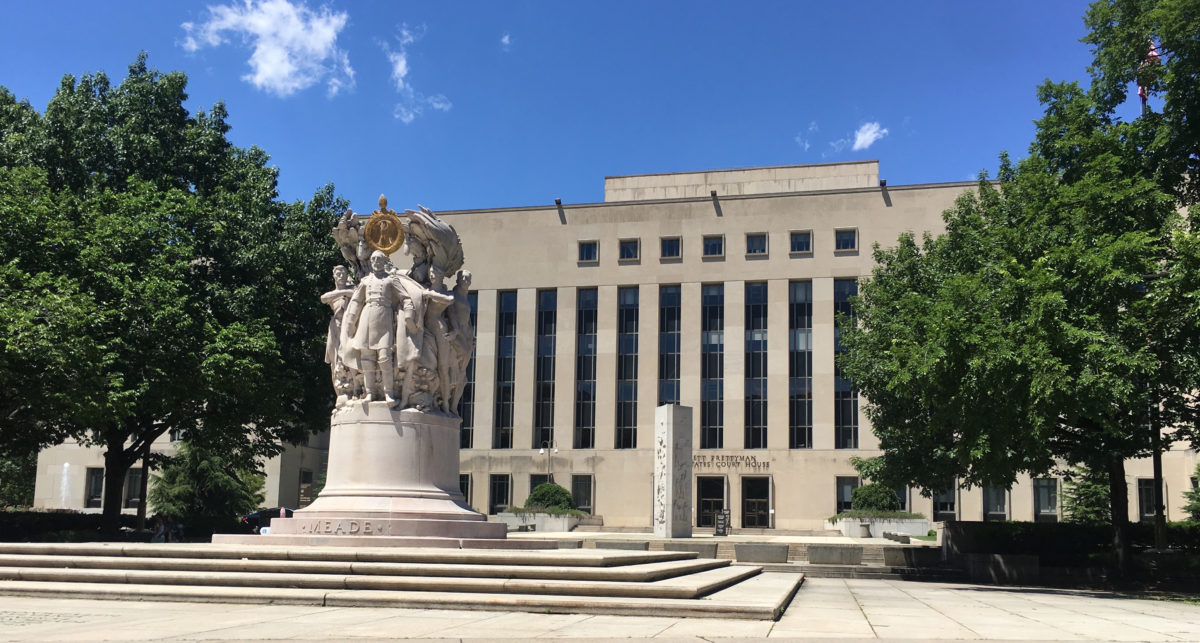The D.C. Circuit releases opinions on Tuesdays and Fridays. We read them all so you don’t have to. On Friday (August 10), the court issued six opinions:
Fares v. Smith. Abdul Mohamed Waked Fares and his son, Mohamed Abdo Waked Darwich, are Panamanian businessmen. In 2016, the U.S. Office of Foreign Assets Control designated them and their businesses as “specially designated narcotics traffickers” under the Foreign Narcotics Kingpin Designation Act. That designation froze their assets in the United States. When Fares and Darwich asked to see the evidence against them, the agency turned over a file that was almost entirely redacted because it contained sensitive information about criminal investigations. Fares and Darwich sued, alleging they have a due process right to see the evidence. A district judge rejected their claim, and in an opinion by Judge Pillard (joined by Judges Wilkins and Sentelle), the court affirmed. Pillard wrote that “designating individuals as traffickers unquestionably implicates serious due process concerns,” but Fares and Darwich lost because they chose “a single, artificially extreme argument”—asking the court to force the government to turn over the evidence wholesale, without even challenging the scope or legitimacy of the redactions.
Paleteria La Michoacana v. Productos Lacteos Tocumbo. Paletas are Mexican-style desserts similar to popsicles. Two vendors, Paleteria La Michoacana (PLM) and Productos Lacteos Tocumbo (Prolacto), have been selling paletas for over a decade in several overlapping markets in the United States. Both companies also branded their products with some variant of the phrase “La Michoacana” and a logo of a cartoon girl. This competition over sweets began to turn bitter, and after Prolacto spent roughly three years arguing that PLM violated trademark laws, a district judge sided with PLM on nearly every point of contention. Prolacto continued its challenges against PLM in an appeal over portions of the district judge’s determinations, but in an opinion by Judge Pillard (joined by Judges Griffith and Edwards) the court found “no merit in Prolacto’s remaining arguments.” Pillard concluded that Prolacto could not claim exclusive right over the branding at issue and failed to show that it was injured by PLM’s branding and advertising.
Capital Medical Center v. National Labor Relations Board. In 2013, a local union representing employees at Capital Medical Center, a hospital in Olympia, WA, peacefully distributed leaflets and quietly held picket signs on hospital property next to the entrance. The hospital asked the union to leave and called the police to have them removed, although the police declined to do so. The union complained to the NLRB that the hospital had interfered with its right to engage in protected union activities. The NLRB agreed. In an opinion by Judge Srinivasan (joined by Chief Judge Garland and Judge Rogers), the court held that the NLRB had reasonably balanced the hospital’s property rights against the employees’ right to picket. The court emphasized that the picketers “did not chant, march, or obstruct visitors from entering or leaving the hospital,” and the hospital “offered no evidence demonstrating that the peaceful holding of picket signs nonetheless could disrupt patient care.”
Steele v. Mattis. The Department of Defense hired 47-year-old Brett Steele for a three-year term as an associate professor at National Defense University in 2010. The department fired him after year one. Steele sued, alleging age discrimination. The district judge granted summary judgment to the department despite the fact that Steele produced evidence that “a supervisor directly involved in the decisionmaking process made repeated discriminatory remarks” and that the college was “inconsistent in its explanations” of Steele’s termination. In an opinion by Judge Millett (joined by Judges Griffith and Pillard), the court took on the “humble” task at the summary judgment stage of asking “whether, taking all of the evidence together, it would as a matter of law be irrational for jurors to disbelieve” the college’s “assorted rationales” and to believe Steele’s story. The court said no and sent the case back to the district court to give Steele another shot.
United States v. Williamson. Jeffrey Williamson made multiple phone calls to the FBI threatening one particular officer with whom he had a “longstanding obsession.” In June 2014, Williamson repeatedly stated he would shoot the agent “in his f—in head” after the agent issued him several citations related to similarly threatening phone calls. A jury convicted Williamson of making a threat against a federal law enforcement officer. Williamson raised several challenges to his conviction on appeal. In an opinion by Judge Srinivasan (joined by Chief Judge Garland and Judge Rogers), the court rejected most of his challenges save one. Williamson said, and the government conceded, that the district judge should not have denied him access to jury-commission records. The D.C. Circuit agreed and instructed the district judge to give Williamson access to those records.
Billings Clinic v. Azar. Under the Medicare program, the federal government pays hospitals special “outlier payments” intended to cover treatment of Medicare patients who incur extraordinarily high costs—and to calculate those payments, the government uses a formula that is extraordinarily complex. When the government adjusted that formula in 2007, hospitals challenged it, and the court upheld it. Hospitals also sued over the government’s continued use of the new formula in 2008 through 2011, arguing that it was arbitrary and capricious for the government to stick with the new formula because, they said, it was consistently underpaying hospitals. In an opinion rife with arcane Medicare reimbursement equations, Judge Millett (joined by Chief Judge Garland and Judge Srinivasan) rejected the hospitals’ challenge. While their frustration over Medicare’s “frequently off-target calculations” is understandable, Millett said, “the methodology has not sunk to the level of arbitrary or capricious agency action.”
![]()

